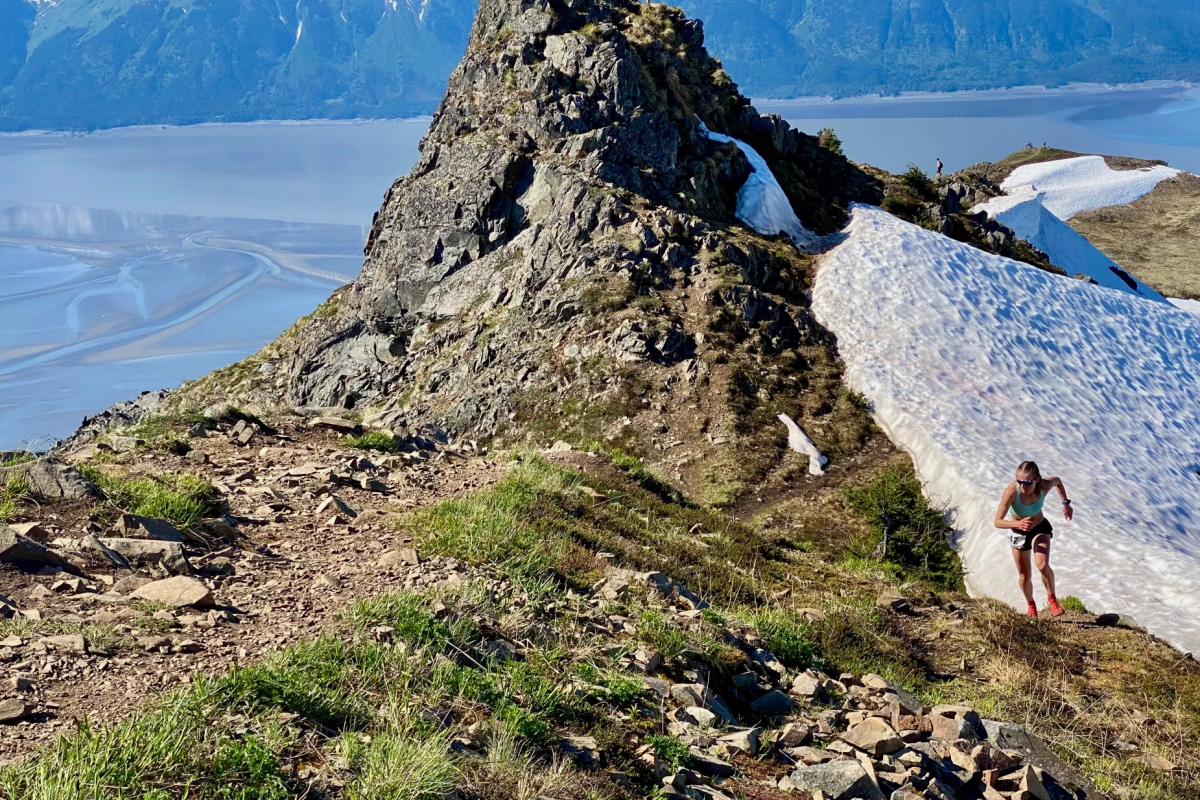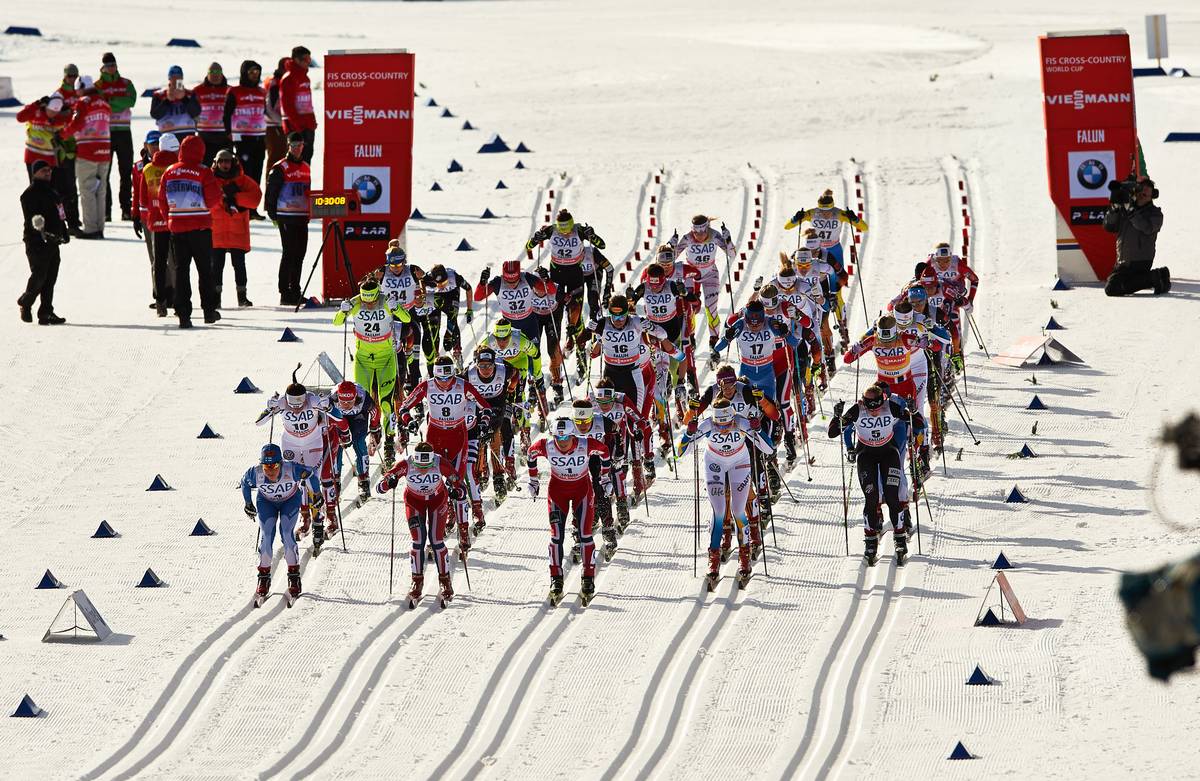
With two races left in the World Cup season, Liz Stephen could’ve raced like she had nothing to lose. But the skiathlon is a race of strategy as much as skill, and on Saturday at World Cup Finals in Falun, Sweden, the longtime U.S. Ski Team member decided she’d better start conservatively in classic.
Hovering in the mid-30’s for most of the race, Stephen later explained that the first half of the women’s 15-kilometer skiathlon, turned out to be a “pretty standard classic race” for her. No bells or whistles, but she didn’t need them. She had 7.5 k to make up ground.
About a minute and a half behind the leader, Norway’s Therese Johaug, at the halfway point, Stephen in 37th transitioned smoothly to skating and began her own race. Between 8.2 and 9 k, Stephen rose from 34th to 25th. With less than 4 k to go, she was up to 16th.
“The skate portion went much better than the racing has been going lately,” Stephen, 27, wrote in an email. “The body was really ready to race out there during the skate.”
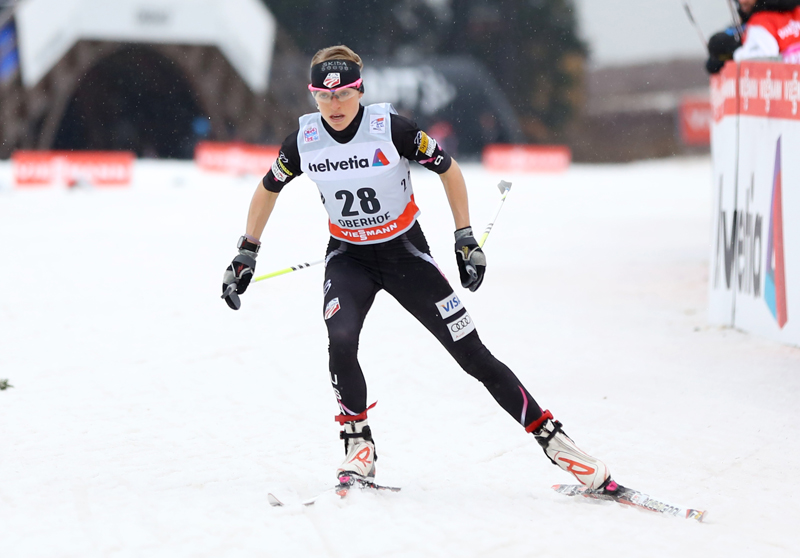
She ended up picking off one more person (Finland’s Krista Lahteenmaki) to finish 15th, 2:08.3 behind Johaug, who won by more than 33 seconds. The result put her 18th in the World Cup Finals standings and 15th in the season-long distance ranking— tying her personal best from last year. With one race remaining on Sunday, the 10 k freestyle pursuit, she was 17th in the overall World Cup.
“The goal going into the season was top 15 in the overall and top 10 in the distance list,” Stephen wrote. “I am close to those goals, and improving over last year’s standings in the overall is certainly something to recognize as a step in the right direction.”
Last season, she was 20th overall — 22 places better than she had been the year before.
“I am happy that the season is coming to an end and going home for a break is in sight,” Stephen wrote. “I am not so much tired as mentally ready to change it up, get out of hotel rooms for a while and be back in the USA with my family for a while. Recharge a bit.”
First, she’ll go with most of the team to Anchorage, Alaska, next week for SuperTour Finals and U.S. Distance Nationals March 22-28.
Looking back on the season, Stephen emphasized the success of her teammate, Kikkan Randall, the three-time defending World Cup Sprint champion, and how she has impacted the rest of the team.
“She has taught me to believe in myself, how to work harder, try new things, be open to the idea of being the best in the World someday,” Stephen wrote. “The fact that she instills this fun atmosphere on our team while also kicking serious a** on the world cup, year in and year out is really inspirational and special to be a part of. I’m really very proud of her and to be her teammate in so many ways.”
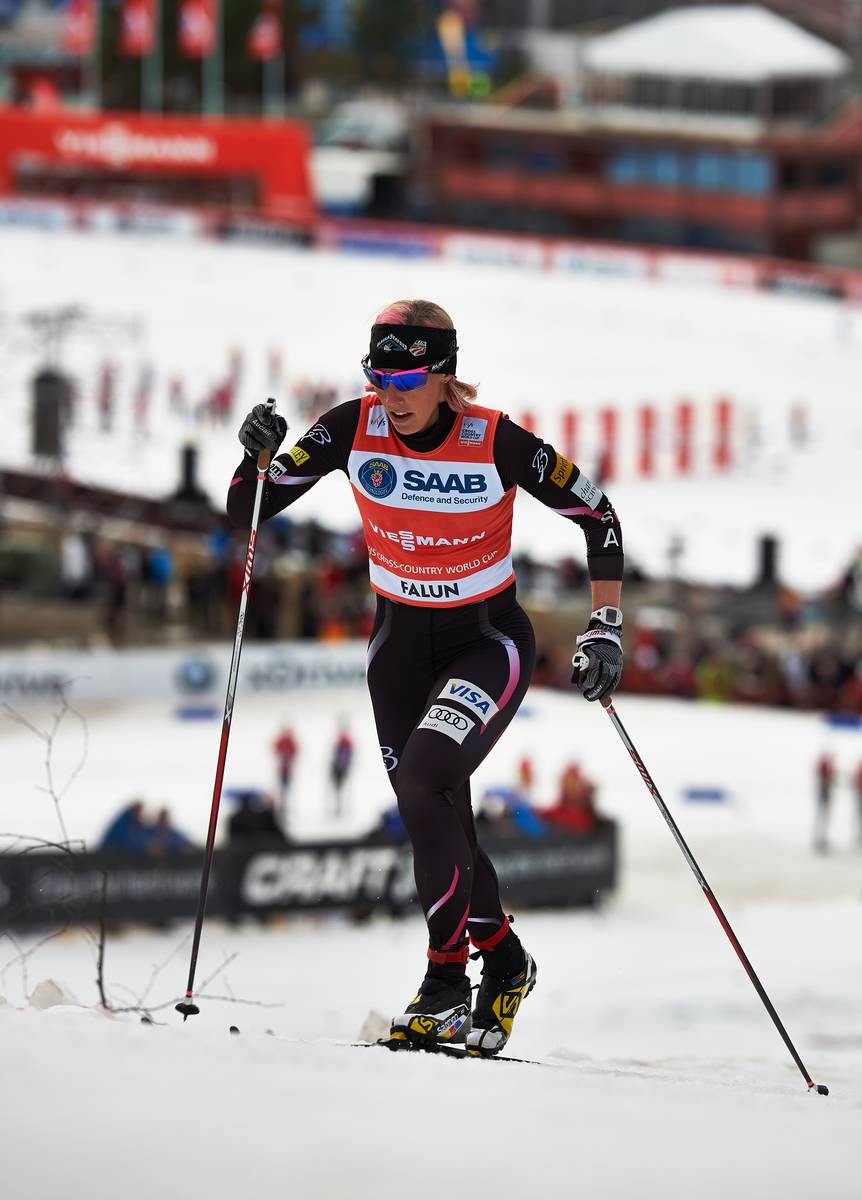
Randall finished 20th (+2:25.6) on Saturday in one of the few World Cup skiathlons in her career. The result put her 17th in the distance rankings, and kept her in fifth overall — 30 points behind Norway’s Heidi Weng in fourth.
“I wanted to be up in the top 15 so I fell short of that goal today,” Randall wrote in an email. “I still have some good opportunity to move up tomorrow and I need to fight for every point.”
Randall skied around 20th for much of the race, moving up from 21st at the transition to 19th at 8.2 k. Lahteenmaki edged her by 0.4 seconds for 19th, and Randall finishing four seconds ahead of her U.S. teammate, Sadie Bjornsen.
“To have a good result you have to go with that opening pace and try to stay up near the front,” Randall explained. “I tried to start hard but my body was pretty tired from the sprint yesterday. I was skiing mid pack in the classic and then headed out on the skate with some girls to chase. I had some good sections were I felt I was picking up time and then some bad parts where I had a hard time keeping my glide up in the skate. I came into the stadium with a couple girls but didn’t ski the finish very well. It was an okay day for me.”
Like Stephen, she was excited to wrap up the season.
“It’s been a lot of racing and a lot of emotional energy, especially in the last six weeks,” Randall wrote. “It’s been a pretty good season. Overall I was happy with my consistent sprint performance but felt I went backwards a step in my distance skiing. And of course the Olympics was my biggest goal of the season and I didn’t reach my goals there. I am definitely ending this season wanting more.”
Bjornsen started faster and was 12th through 6 k and ninth at the transition at 7.5 k, just 43 seconds behind Johaug.
“The pace went out super hard from the start,” Bjornsen recalled. “It was quite windy out there, and I was breaking wind in my outer track for the first couple of k’s … so I was struggling to stay on pace. After jumping in behind some girls, I found control, and the classic portion went really well from that. I had great skis. I chose to go on the slicker side, which made for some rocket fast skis on the downhill.”
The transition to skating proved to be Bjornsen’s biggest challenge as she slipped to 17th within the first kilometer out of the stadium. She recalled a pack of about 10 people passing her in the first 10 minutes, and was in 20th with 4 k remaining.
“I was able to turn it around shortly after when I got the feelings back in my legs,” she wrote. “It was fun to be out there trying to ski with Kikkan, and then reel back some of the skiers that had passed me by the end.”
Conditions were a factor as the night before brought a mix of rain, sleet, then snow, according to Stephen. “But the skiing was good,” she explained. “Pretty transformed snow and the high winds blew some snow into the tracks in places making the conditions slow in some spots and very fast in others.”
The course itself is what many of these same racers will be tackling at World Championships next season. Several North Americans said they liked the course, and Stephen described it as “hard, fair and fun.”
“The are a fun level of challenging!” Bjornsen wrote.
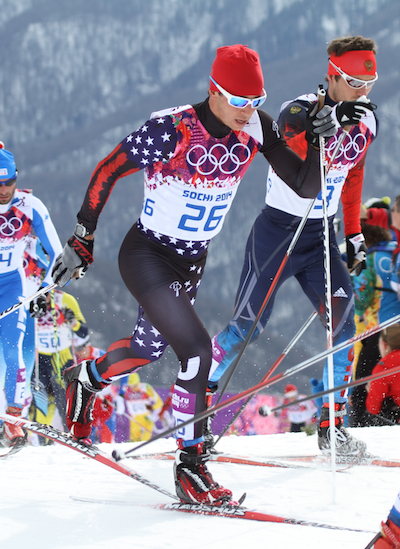
Noah Hoffman led the U.S. men in 18th, 2:48.3 behind Canadian winner Alex Harvey.
Going against his instincts, he decided to play it relatively safe and pace himself throughout the men’s 30 k skiathlon. Hoffman, 24, is known for his tendency to try to lead or stick with the leaders in distance mass starts, but his goal was to score around 20 to 25 points throughout the three-race Finals to put him in the Red Group in the distance standings.
“I scored 13 points today so I need to do something similar to tomorrow,” he said of the pursuit. “Which is nice, better than it could have been.”
Out of the start, he said the pace wasn’t too fast, but he focused on gradually working his way up from just outside the top 40 to 25th within the first 3.75 k. He was 20th at 5 k, 14 seconds behind the leaders, and halfway through the classic leg Hoffman was skiing 30 seconds back in 22nd.
“I was trying to be patient and stay a little more conservative,” he said. “I wanted to be skiing a little further back in the group. I did that and I don’t know that my strategy mattered that much today because I wasn’t quite good enough to be able to go with that fairly large group that ended up shelling everybody else.”
The group he was talking about was the chase pack, which Norway’s Eldar Rønning initially led to try to cut down a 20-second gap on the four leaders at 8.7 k. Hoffman was at the tail end of the group with Ivan Babikov in 23rd and 24th, respectively, and with one lap to go in classic he was detached, trailing the leaders by 45 seconds with Norway’s Sjur Røthe.
“I did end up with a good ride behind Sjur Røthe for the classic, which was really good and I know he is a great skater and he proved that today,” Hoffman said. (Røthe ended up seventh.)
“I was definitely hoping to be able to go with him which would have led to a really good result, but I just wasn’t quite good enough in the skate,” he added. “I have had a little bit of a tough time transitioning from classic to skate and I need to continue to work on that. Once I got into the skate, in the last two laps of the skate I was feeling better and moving up more.”
For the second half of the race, Hoffman mostly stuck around 20th. He heard he was in 19th about halfway through the skate leg, which was where he figured he needed to be.
“It was definitely the right thing to do, it is what I need to do more of,” Hoffman said of his pacing strategy. “There was definitely a couple of movements where I was like, I could definitely move up from here, and then I had to settle myself down and say this was a fine place to be. But for the most part, I think it was good. I did what I wanted to do and I think I am learning slowly, slower than I would like to be.”
At this point in the season, Hoffman said his energy is good, but he’s excited to go home and will stop at his base in Park City, Utah, between racing in Alaska and vacationing in Mexico.
“I think fitness is tailing off a little bit; I train a lot less than my teammates throughout the winter and it has been a long time since I have done any substantial training,” he explained. “But that is fine … [to] still be able to ski into the points with this fitness is good so I am looking forward to a little bit of domestic races when I go home, something I haven’t done in two years.”
Hoffman ranks 28th in the World Cup distance standings, just within the top-30 U.S. team criteria, and 35th overall with one race to go. He will start 21st, 4:19 back from Harvey as the leader and a second behind 19th and 20th in Sunday’s pursuit.
— Matt Voisin contributed reporting
See also: Two Weeks After International Debut, Hanneman Nabs PB’s; Diggins Also Close
Alex Kochon
Alex Kochon (alexkochon@gmail.com) is a former FasterSkier editor and roving reporter who never really lost touch with the nordic scene. A freelance writer, editor, and outdoor-loving mom of two, she lives in northeastern New York and enjoys adventuring in the Adirondacks. She shares her passion for sports and recreation as the co-founder of "Ride On! Mountain Bike Trail Guide" and a sales and content contributor at Curated.com. When she's not skiing or chasing her kids around, Alex assists authors as a production and marketing coordinator for iPub Global Connection.


